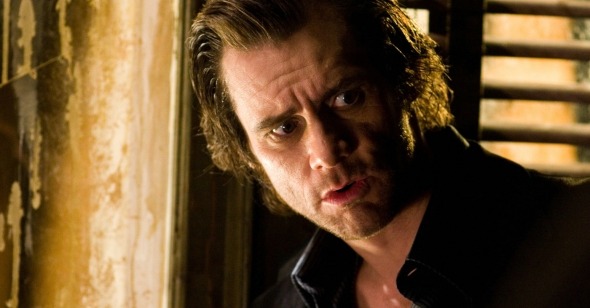Not Adding Up
by Michael Joshua Rowin
The Number 23
Dir. Joel Schumacher, U.S., New Line Cinema
The Number 23 is the best kind of guilty pleasure: a psychological thriller that does absolutely nothing to make you take it seriously. And because it features a deliciously paranoiac plot centered on a numerological belief that all events are structured around the title number, it does just enough to win over an ex-X-Files casualty like myself. But perhaps I am more envisioning its potentialities than pondering its actualities—we are, after all, talking about a film with a lamely preposterous outcome presided over by Joel Schumacher, the notorious hack loathed by audiences and critics in equal measure. I fully realize The Number 23 is bad, but, still, after seeing its only half-deserved Metacritic rating of . . . 25, I had to offer a tentative consideration of what it could have been. Since we live in a world where collective critical gushing gets occasioned by a film as slight as Pan’s Labyrinth, I think I’m entitled to one frivolous moment of partial revisionism. Indulge me.
Actually, I’m not sure if it’s an indulgence to give at least a little credit to the relevance of The Number 23. We’re living in a time, after all, where only hours after a terrorist bombing (Madrid 2004) people speak of the eerie coincidences that had the act occurring exactly two and a half years (911 days) after 9/11. Such unfocused, superstitions pervade The Number 23 and give it its edge, the only promise that allows one to see the film through once it becomes a disaster of explanatory absurdities and Christian homilies about fate and sin. The atmosphere, needless to say, fails to be sustained by Schumacher, a director who has thus far never met a visual motif he couldn’t run into the ground (here, the color blood red) or a mise-en-scène he couldn't somehow uglify. There’s also a silliness intrinsic to the film’s design: Jim Carrey plays not just good-natured dog catcher Walter Sparrow but also Detective Fingerling (the film’s alter egos, as we’ll see, have the most ridiculous names this side of Lord of the Rings), imagined from the book with which Sparrow becomes obsessed. The book, The Number 23, written by one Topsy Krets (told ya), is about Fingerling’s sexual violence and how it becomes fostered by that darn number. Sparrow believes that the book mirrors his life in enough details that he starts seeing 23s everywhere (in names, addresses, dates that are added, subtracted, divided, multiplied in the most contorting ways) and worrying what it might mean that Fingerling eventually kills his mistress, Fabrizia (Virginia Madsen), the fictional version of his wife Agatha (Madsen again). It’s all very meta despite the fact that it barely holds together—especially in the latitude his family is willing to give him when he goes nuts looking for the pattern behind the book and the number, and in Fingerling’s giggle-inducing goth tattoos and neonoir saxophone.
The problems reside first and foremost in the film’s pacing, which tries to cram so much information and oddities into 95 minutes that it often forgets to properly introduce characters (Danny Huston’s possibly cuckolding doctor-friend) or convince us that its events (Sparrow’s son immediately believes his father’s ravings and unquestioningly aids him in his quest for the truth) contain realistic, and therefore disturbing, possibilities. The Number 23 is the misfiring opposite of Jacques Rivette’s obscurant, trance-like epics—Schumacher is so distrustful of his audience’s attention that he deadens the entire conspiratorial affair by forcing it into overstimulation. Everything is simultaneously too busy and too flat, from Carrey’s predictably manic-dour performance to the nauseatingly saturated brightness of the Suicide Blonde’s (Lynne Collins) apartment in the story within the story.
Schumacher also telegraphs the meta-doublings and religious metaphors with the same rote literalism as the “hidden” 23s that populate the film’s hemmed-in world (spot the clues!), sabotaging the film’s enjoyable premise with symbolism so uninspired and an ending so cruelly dumb that it makes Donald Kaufman’s “The 3” look like the pinnacle of cleverness. The Number 23 and films like it can never provide a satisfactory payoff: if no answer is offered to its persistent mysteries then an unrelieved frustration dominates, overshadowing the investigative process at the heart of the story; if an answer is offered then it usually fails to live up to preceding, grandiose promises. A delicate handling of either of these issues is rarely achieved in conspiracy films, and The Number 23 suffers from a miscalculation in the second vein, contriving its plot to fit some sort of moralistic “the past comes back to haunt you” nonsense.
As friend and colleague Nic Rapold has pointed out to me, Jim Carrey’s projects (The Truman Show, Liar Liar, Eternal Sunshine of the Spotless Mind) often involve his characters’ environments tampered with from beyond, occasioning his journey of self-discovery. As the latest installment, The Number 23 probably would have best been served not conforming to this pattern. Luckily the film is just engaging enough to imagine alternatives for it. One thinks of the Borges story “The Zahir,” in which a mystical token throughout the ages exponentially occupies its beholder’s thoughts upon first sight. The narrator comes upon the Zahir in the form of a coin and realizes that soon the universe and the Zahir will be synonymous in his mind: “Perhaps I will manage to wear away the Zahir by force of thinking of it and thinking of it. Perhaps behind the Zahir I shall find God.” God = 23 = oblivion, perhaps. Such haunting transcendence via obsession might have saved The Number 23, or at least placed it inside an enigma preferable to a phony conclusion nobody seems to have bought.
